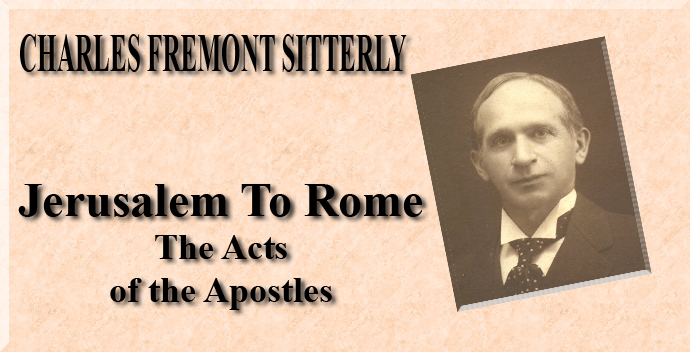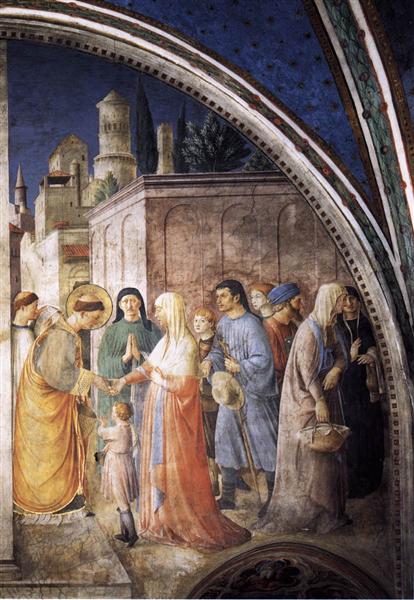|
At this time, as the number of the disciples was constantly increasing, the Greek-speaking Jews began making complaints against the native Jews on the ground that their widows were being overlooked in the daily distribution of food. So the Twelve called the throng of the disciples together and said:
“It does not seem proper for us to neglect the preaching of the Word of God and serve tables. Therefore, Brothers, pick out seven reputable men of your own number, spiritually-minded and wise, whom we may appoint over this business. We ourselves, however, will continue steadfastly in prayer and in the ministry of the Word.”
This proposal commended itself to the entire throng, and they chose Stephen, a man full of faith and of the Holy Spirit; Philip, Prochorus, Nicanor, Timon, Parmenas, and Nicolaus, a proselyte of Antioch. These men they brought to the Apostles, who after praying laid their hands upon them. Meanwhile the Word of the Lord kept spreading and the number of the disciples rapidly increasing in Jerusalem, and a large number of the priests became obedient to the faith.
|
|
Thus early we have come to the embarrassment of large success. With growth in numbers complications always arise, especially when social groups of different races are involved. Add to these facts the most perplexing of all, namely, how to satisfy the varying tastes as to table-board of charity recipients, and they widows, and so doubtless no longer young, and you have the case heightened to the explosion point. No wonder it irritated the Twelve and called for diplomatic, if not drastic treatment. The common rights of the throngs of disciples, now numbering many hundreds, are carefully respected, and their suffrage enlisted in settling the situation. Although the Apostles suggested the plan which was adopted they did not foist it arbitrarily upon the assembly nor take its adoption nor operation out of the hands of the multitude. The throng chose the Seven, and the Twelve but confirmed and sanctioned the act, with solemn prayer and laying on of hands, and thus the danger point was happily passed. Glancing at the names of the Deacons, as they came to be called, we see how excellent was the judgment which the disciples used. Luke does not characterize any but Stephen, and then probably only because of his later martyrdom; but he could say as much of Philip as of Stephen, and doubtless Nicolaus of Antioch was one of the important links in the ultimate transfer of power from Jerusalem to that city. The Greek type of names is always remarked upon as showing a fine sense of propriety in the effort to allay further criticism. The fact that a like question is not again raised is confirmatory of the satisfaction wrought. The sequence of sentences also points in the same direction, for the period of prosperity is only accelerated meanwhile, ‘and the continued rapid increase in the number of the disciples, especially of converted priests, may not be without actual relation to the improved conditions now known in connection with the
administration of the sustentation funds. The fact that so soon large numbers of the priests “become obedient to the faith,” as well as the fact that neither they nor anybody else of standing ever denies the testimony which the Apostles and Evangelists are always asserting, is one of the most important evidences for the truth of said testimony that could possibly be given.
|
|
Now, Stephen, who was full of divine favor and power, was doing great marvels and signs among the people. Certain members, however, of the so-called synagogue of the Freed-men, and of the Cyrenians and Alexandrians, together with some from Cilicia and Asia, became aroused and began to dispute with Stephen. But they could not withstand the wisdom and the Spirit with which he spoke. As a final resort they induced some men to say) “We have heard him utter blasphemous expressions against Moses and God.”’) In this way they stirred up the people, the elders, and the scribes, who rushed upon him, violently seized him, and led him before the Sanhedrin. Here they brought forward false witnesses who said:
“This man never ceases his talk against this Holy Place and the Law. For we have even heard him saying that this Jesus, the Nazarene, will pull down this Place and will change the customs which were handed down to us by Moses!”
So all that were sitting in the Sanhedrin fixed their eyes upon him, and they saw that his face looked just like the face of an angel. |
|
The disruption of inward community peace which was so imminent and so adroitly avoided in the last paragraph is now threatened from without and finally accomplished by the foul assassination of the foremost deacon just elected. Stephen was no less efficient in serving the spiritual than the temporal interests of the people. As his stewardship cannot be successfully attacked, his theology is brought into question. One cannot help noticing that it is from precisely the class whose widows Stephen is so kindly serving, namely, the Hellenists, or Greek-speaking Jews, that the venomous assault springs forth. The mention of certain from the synagogue of Cilicia among the enemy is often said to refer possibly to the coming protagonist from Tarsus, who is to play a title role in this drama.
As Stephen in his fully reported defense does not deny specifically the charges laid against him, but, rather, explains and defends them, we get an inkling to the subject of the disputes which brought on his arraignment for blasphemy. That he worsted them one and all in open argument only deepened their fell determination to silence him forever. It is easy enough to understand how the scribes and elders could be induced to attack Stephen, but that the people were so large a party to the action bespeaks the most consummate plot that had been hatched in Jerusalem for many a day. Several points of comparison are found between Stephen’s martyrdom and that of his Lord, but Dr. Ramsay well remarks that in two respects the contrast is equally clear—when Jesus was formally accused before the Sanhedrin “He answered to never a word.” Stephen replied in possibly the longest address recorded in the New Testament. Stephen, moreover, was deeply moved, whereas Jesus was perfectly quiet throughout. Surely, the chief charge which seems to have precipitated Stephen’s arrest—his alleged depreciation of the Temple and the law of Moses—is
identical with that laid against Jesus. He appears to have quoted Christ’s remark about the coming destruction of the earthly temple; that its spiritual counterpart might more fully appear, but, of course, as in the case of his Master, he was not guilty of the slightest tendency or desire to bring either disaster or disruption upon Jewish law or institutions. Stephen’s shining, angelic countenance gave the lie direct to all such base insinuations, but this only served to inflame the passions of his hot accusers the more.
|



 Home
Home What's New
What's New Bible
Bible Photos
Photos Hiking
Hiking E-Books
E-Books Genealogy
Genealogy Profile
Free Plug-ins You May Need
Profile
Free Plug-ins You May Need
 Get Java
Get Java.png) Get Flash
Get Flash Get 7-Zip
Get 7-Zip Get Acrobat Reader
Get Acrobat Reader Get TheWORD
Get TheWORD